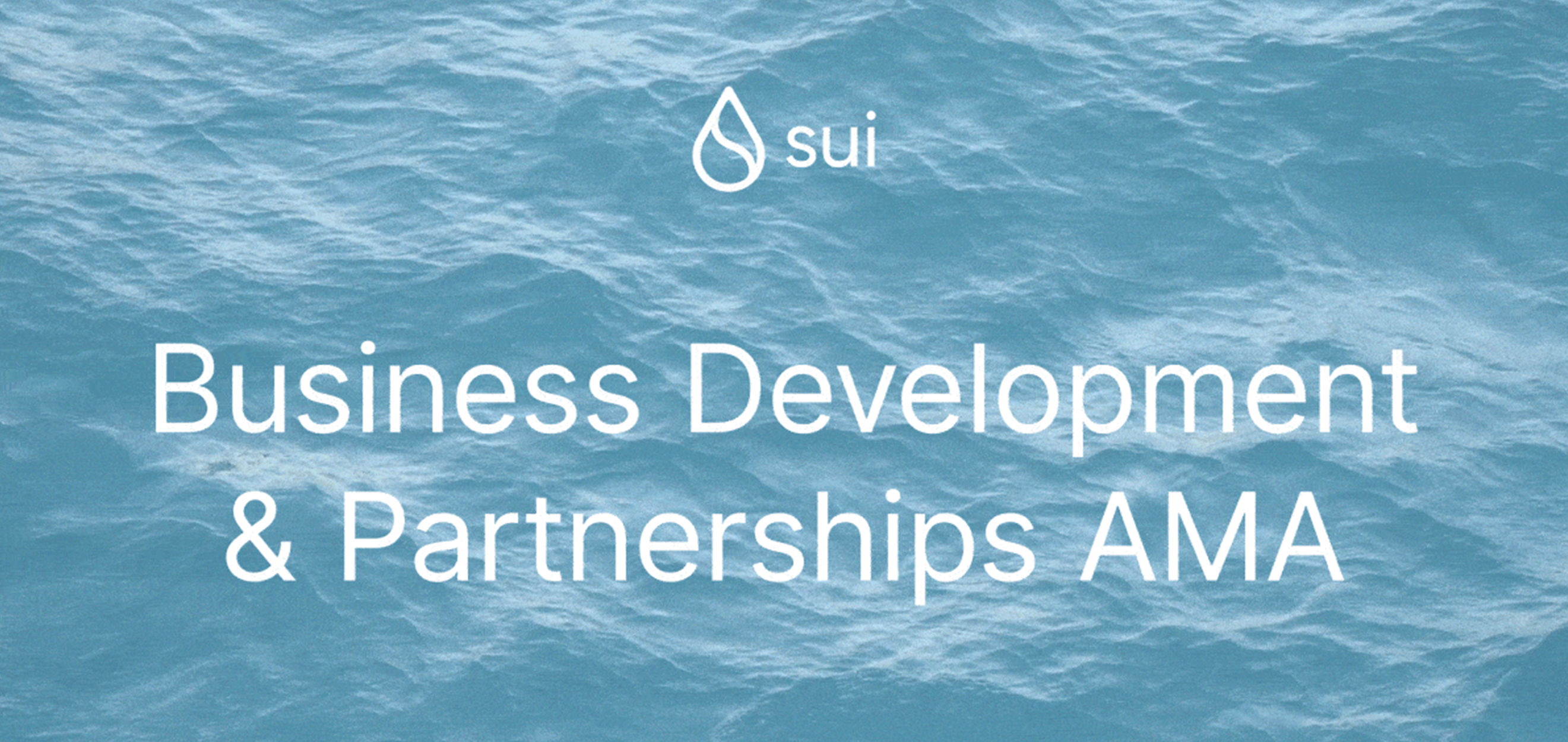Recap 8/18 Sui AMA: Business Development & Partnerships with Jameel Khalfan
This recap covers an AMA about business development on Sui with members of Mysten Labs.

Jen:
Welcome to our latest AMA. Our topic today is about business development and partnerships with our guest Jameel on stage.
Jameel:
Hi everyone, I’m excited to be here. My name is Jameel – I'm the Head of Consumer Partnerships at Mysten Labs. I've spent the last decade in games and I’ve invested in various crypto projects. I spent some time working on the Google Play Store and before that, I worked at Pocket Gems helping to launch the Episode creator platform.
. . .
Question #1: What are your criteria for selecting a partner for Sui?
Jameel:
We have a few criteria:
1. What's the need for the ecosystem?
We're looking for partners across the ecosystem, everything from infrastructure providers to Developer Tools, and then ultimately to content like games and NFT projects.
2. Where are the gaps?
To identify the gaps we start meeting with different companies and different teams that are proposing projects. We look if the team has worked together before, and whether they have already worked on a web3 project. How have they been designed? What do we need from them? We need these answers to make sure that we're both able to deliver and bring to the table.
3. Where are the opportunities right now?
We make sure that the teams that we work with are aligned and we seek those that are truly interested in building something that's going to be sustainable and lasting.
. . .
Question #2: Can you share any types of blockchain games that are coming to Sui?
Jameel:
We haven't announced any specific companies or titles yet but I can give an idea of the types of games that we're excited about. It's important to note that our team has a really deep game experience. So our focus is going to be on:
- Fun games to play with a sustainable business model and long future goals.
- Games that can use Sui’s composability features like upgradeable NFTs and that take advantage of the unique features that we have built.
. . .
Question #3: What's the best project you've worked on before joining Mysten Labs?
Jameel:
That's a tough one…I worked on a bunch that I had a lot of fun with but I think the most fun was working on an app called Episode – which is a creator platform for interactive storytelling and that became really popular. It was really fun for various reasons:
1. Being able to take this format and apply it to some traditional IP.
2. We were able to work with various movie franchises and some celebrities.
3. Had a UGC platform aspect where people wrote stories for fun and earned money while also being able to share their stories with the world.
This type of product would be perfect for web3 where you can get a bunch of creators involved.
. . .
Question #4: What is your advice for people who are looking to get into business development or partnerships?
Jameel:
I think it's a fun place that has a lot of opportunities. So if you like people and enjoy seeing and having a lot of different projects and you’re interested in getting into BD you need to think about which industry you’re interested in and what excites you the most. I would recommend asking yourself:
- Do you care about Defi?
- Do you care about gaming?
- What types of partnerships do you want to try and work on?
Choose an area that you have some experience in and that you have a lot of curiosity about. It's important to understand how various investment structures work and how different partnerships you see in the news structure their arrangements. You need to be able to study that – and over time all the partnerships that you see and read about will help you build up that muscle. After that, you meet some people that are already in the field and get to know them and put yourself out there and be able to find an opportunity.
. . .
Question #5: What is the difference between business development and partnerships, or is there no difference?
Jameel:
Good question. I think those two are often used interchangeably. I don't see a huge difference between the two. I think the one distinction is typically the teams, they're divided into two different groups:
- There’s one team that will go out and find new opportunities for the company, and new types of partnerships to form and I call them “the hunters.” In order to succeed here, you'd want to have a large network, and be able to think very creatively about how two companies could work together.
- There’s another team that once the agreement is done and the companies have decided to work together, they will do more partner management or account management. Typically the type of profile that works well there is someone who's super extroverted and always out there trying to meet everyone and be able to build long-term relationships.
. . .
Question #6: What are the signs that a deal is going well, or not?
Jameel:
It's always hard to tell but I'd say the majority of the time:
Things are going well:
- both parties are going to gain from doing this deal together
- it’s a win-win for everyone
- teams are aligned for both parties
- everyone is on board (Finance, product, engineering, etc)
- both sides are highly communicative and very collaborative
Things aren’t going well:
- Misalignment: one company is benefiting way more than the other
- There's pushback from internal teams
- Bad communication where you're not hearing back from them
- One party is really slow
. . .
Question #7: What are the mainstream issues facing gamers that blockchain gaming can help solve?
Jameel:
There's a lot of debate among gamers about what issues blockchain will solve and what benefits people are going to get. But the area that I'm personally excited about is the desire for ownership. If you think back to earlier days of gaming, people trying to sell World of Warcraft accounts on the gray market, there was always this desire for people to own the things that they acquire within games and then if they don't want those things anymore they can sell them. I think blockchain gaming can help solve that piece by actually letting people design games or own items in the game and get rewarded in certain ways for engaging with the game.
. . .
Question #8: How do you approach recruiting in the Mysten ecosystems business development team?
Jameel:
The first piece is, looking at the strength of someone's background. We try really hard to recruit from our own networks, people that are referred to us, and then just people that ended up applying to make sure we have a good candidate pool. We're focused on gaming, entertainment, sports infrastructure, and Defi commerce so we look at how strong the background of candidates have in those areas.
The second piece is looking through functional knowledge. We try to find people that have been able to do deals before and do partnership agreements before and who understand what it takes to get two companies to work with each other and how to manage partners on an ongoing basis and maybe they worked in sales and product.
The last piece is, we look at how people have decided to engage with web3 and crypto, is it something they're enthusiastic about, do they do it in their spare time to learn, and how they have done things in the past working in a web2 company.
. . .
Question #9: What’s your favorite game that got you into gaming?
Jameel:
Command and Conquer Red Alert. I remember playing as a kid a lot with my friends and this is when we had dial-up modems and only one phone line. Their parents would get mad at us for playing and half the time the connection wouldn’t even work.
Also, Age of Empires. During the pandemic, they had remastered versions of those games come out and I spent a bunch of time playing with friends.
. . .
Question #10: When will AAA titles on crypto be commonplace?
Jameel:
This is a good question. AAA games can take up to 5 years to make. There are companies that have already been building a AAA game and are thinking about how to incorporate blockchain elements. I think 2 to 5 years from now is when we're probably going to start to see those efforts come to life.
. . .
Question #11: What is the criteria for investors as opposed to BD partnerships?
Jameel:
It's actually largely the same. I worked in venture capital a long time ago and I took a lot of principles from there in terms of thinking about how to evaluate early-stage companies and sort of brought that to the partnership space as well. It's especially applicable here in web3 because a lot of the partnerships we do are going to be with projects that maybe haven't built anything yet and because our ecosystem is early, we don't always have the luxury of evaluating a product. In some cases, we do if we're going to work with an established company, but oftentimes, we're working with builders who want to build in our ecosystem.
The criteria that we use for partnerships are very similar to what we use for investments where we're mainly looking at the strength of the team, can they build the thing that they say they can build, and what needs to be solved.
. . .
Question #12: What is your experience on projects that haven’t gone as planned?
Jameel:
There are a bunch of projects where I underestimated or overestimated the enthusiasm of the other party that we're working with. One of the pitfalls that I learned through a few hard lessons in the past is that you really need to make sure that both teams are very aligned. It's important to look not just at the partnership point of contact but also at what the rest of the group thinks and make sure that the engineering, finance, and legal team are also on board and that everyone is excited.
. . .
Question #13: Why do some partnership deals take a short time and other ones seem to take forever?
Jameel:
So for deals that happen very quickly, it’s when everyone can agree on the work that needs to be done. As an example, if we decide as a company that we are looking for a card battle game for Sui, as well as how much we're willing to spend and we've taken the time to think through a bunch of teams and companies that we'd really like to work with, it's really helpful because then when you do get connected to that company and they agree to work with you, it's an automatic yes, so then things happen really quickly.
For deals that end up happening really slowly in terms of timeframe, I think it's where we're still figuring that piece out. As an example, if a company is deciding, do I go to web3 or not? And after you get in touch with them, they first need to decide that they want to do something in web3, and figure out which partners they want to work with across the ecosystem. Those are the deals that take a long time where maybe there's an interest to work together but there's still a lot that needs to be figured out.

